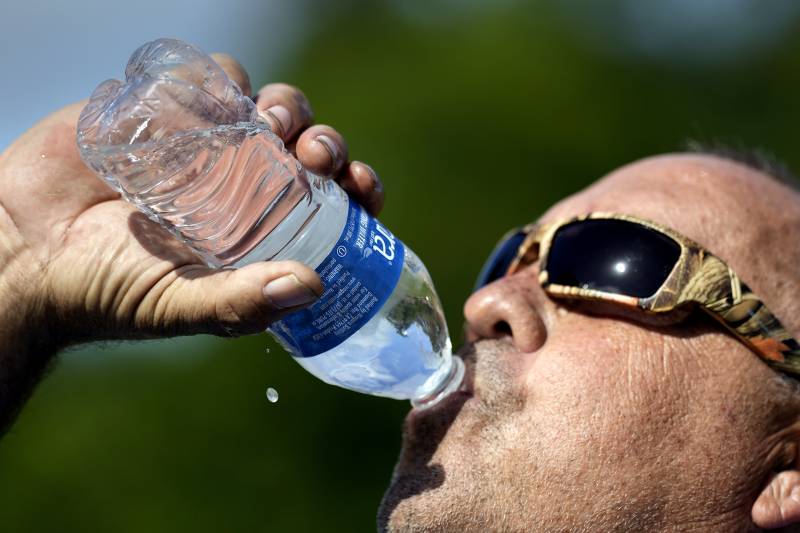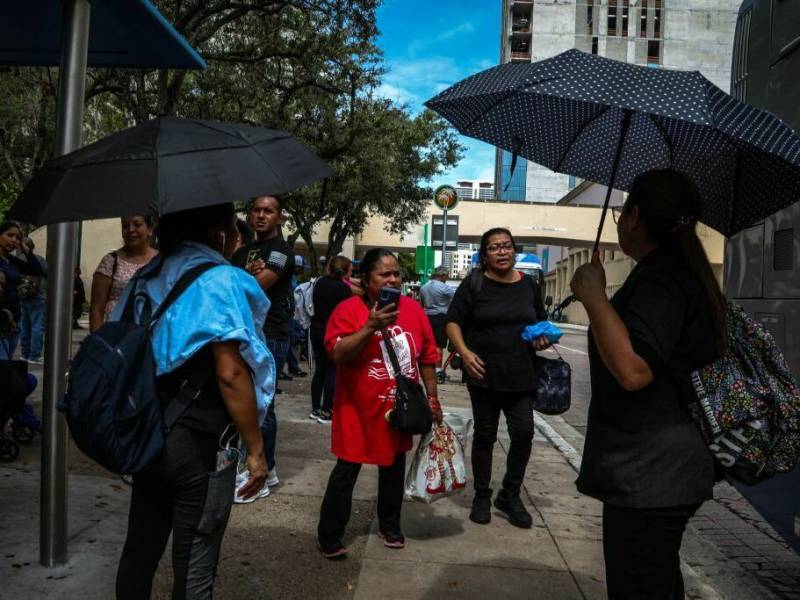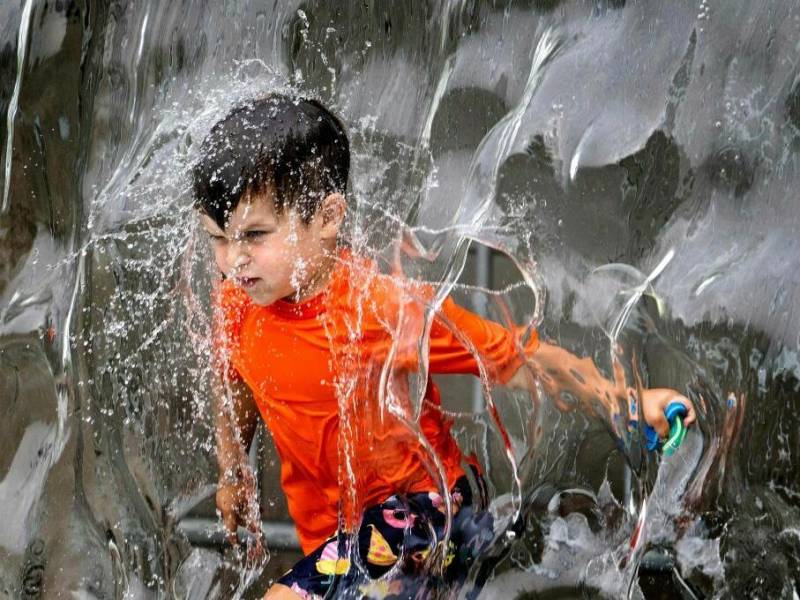It’s hot — which shouldn’t come as a surprise in July. But this summer’s heat is breaking records around the world, and in the U.S. this week, a heat dome is afflicting the Southwest with ultrahigh temperatures. The East Coast is expected to be steamy, and parts of Southern California could hit 106 degrees by Saturday in what the National Weather Service has dubbed a summer of “excessive” weather.
8 Mistakes to Avoid If You're Going Out During the California Heat Wave

Of course, it’s summer and you have things to do outdoors, from festivals to barbecues to mowing the lawn. We get it. But the heat can take a toll on your body, and you need to plan ahead when the temperature rises to extreme heat. “Don’t overdo it,” warns John Schumann, a primary care physician in Tulsa, Oklahoma. “Heat can envelop and pummel you.”
And there are a lot of misconceptions about the best ways to protect yourself, warns David Eisenman, a physician at UCLA who is co-director of the UCLA Center for Healthy Climate Solutions. Here are mistakes to avoid in order to ensure you stay safe in the heat.
1. Too much, too soon: You need to acclimatize
When a heat wave strikes, your body needs time to adjust, says Neil Gandhi, a physician at Houston Methodist Hospital: “You can’t do too much too soon.”
If you go from mostly spending time in air conditioning to an outdoor activity in the sweltering heat, you could be caught off guard. Your body isn’t “acclimatized to handle the stress,” Gandhi says. And every year, about 650 people die (PDF) from heat-related illness in the United States.
Fortunately, once acclimatized, the body gets better at fending off heat-related illness. “Our body starts to sweat sooner at a lower body temperature and at a greater rate,” explains Eisenman. Also, blood flow to the skin improves, which has the effect of cooling us down by carrying heat out of the body’s core. And your thirst increases, so you’re less likely to get dehydrated.
But this doesn’t happen immediately. “It’s going to happen over the space of several days of exposure,” Eisenman says. So if you’re planning a hiking trip, summer sightseeing or any other extended exposure to heat, plan to spend short periods in the heat each day in the days leading up to your outdoor adventure.
And note that kids acclimatize much more slowly than adults, says Eisenman, so give them extra days to prepare.

2. Failing to pre-hydrate (and rehydrate!)
Hydrate in advance, says Wafi Momin, a cardiologist at Memorial Hermann Health System in Katy, Texas. “Grab a glass of water or a sports drink before you head out to the outdoors,” he says.
And bring plenty of water with you, and don’t wait until you’re thirsty to start drinking during an outdoor activity. “The moment you begin to feel thirsty, you’re likely anywhere between 10 to 25% dehydrated already,” says Gandhi.
Most people aren’t even hydrated enough on a normal day, Eisenman notes, so it’s easy to start at a deficit on a hot day. His advice is to double the amount you’d drink in a typical day. The best test of hydration is to check the color of your urine. “Make sure that you’re peeing frequently and that your urine is pale” — almost clear, says Eisenman.
Water is the best way to hydrate — and it’s free! Sports drinks add electrolytes and can be helpful if you’ve gotten overheated or if you’re participating in a marathon or other endurance event — but they’re not necessary when you’re simply trying to stay hydrated throughout the day, says Schumann, who also serves as a medical director for Oak Street Health, a chain of primary care clinics. In Tulsa, he says, in recent weeks they’ve seen bouts of 100-degree weather.
“In these heat-dome times, though I pooh-pooh all the millennials who carry water bottles everywhere, the kids — they’re right about this,” he says.
3. Don’t be the frog in the boiling pot (i.e., your car)
You may not realize how hot it’s getting inside your car.
Cars heat up so fast even in moderate heat because of a “mini greenhouse effect,” Eisenman explains.
“The sun is coming through those windows, and then the heat is getting bounced around and getting trapped inside. It turns into a different wavelength of heat and doesn’t go back out the windows,” he says. “And on a day of moderate temperatures, say like 75 degrees outside, in 25 minutes it will become 100 degrees inside your car.”
Each year, about 50 children die when left in a car. So do not underestimate the dangers, especially if you’re distracted by finishing up a phone call, says Eisenman. “Even with the air conditioner running, even with the windows cracked, it can become hot in there very quickly,” he adds.

4. Heat + (certain) medications don’t mix
Certain medications can make people more vulnerable to heat, explains Momin.
Some heart medications such as blood pressure drugs, which millions of people take, are diuretic, he explains. “Those medications are trying to get rid of fluid from your body because of underlying heart issues,” he says. And if you then add heat, which also causes you to lose excessive amounts of fluid, “that can cause a very dangerous situation.”
Other types of medications can have this effect too, says Schumann. These include anticholinergic medications, anticonvulsants, bladder medications and sedatives. “Lots of medicines work by dehydrating us — excreting excess fluid. Be careful!” he warns.
In general, older people are more vulnerable to heat, so if you’re older and on these medications, take extra precautions to stay cool and hydrated. Ask your doctor whether any of your medicines could be dehydrating.
5. Don’t ignore the early signs of heat-related illness
The first few signs that you’re getting overheated may not feel too alarming: sweating, fatigue, dizziness and headache. You might feel nauseous or lightheaded. But “those are the telltale signs of heat exhaustion creeping in,” says Momin.
“You may just blow it off, saying, you know, it’s hot and I’ve felt this way before, but the worst of the symptoms can come on very quickly without realizing it,” he says. “And all of a sudden, your body’s overheating to a point where you won’t really be able to drink enough fluids at that juncture to reverse what’s already gone on.”
Symptoms of heat exhaustion can quickly become more serious. They can include muscle cramping, increased fatigue and accelerated heart rate. “You may start to weaken and just kind of get out of breath as you exert yourself,” Gandhi says.
6. Know when to seek medical attention
If you’re with someone who begins to show signs of heat-related illness, move the person to a cool place, give them water or a sports drink and moisten their skin. You can also remove unnecessary clothing such as shoes, socks and jackets.
Then, observe them. Their symptoms should start to improve in about 30 minutes, Eisenman says. If they don’t get better in that time or if at any point they start having more worrisome symptoms, call for medical help. “I think sometimes people wait too long to call 911,” says Eisenman.
“If their heart rate is going fast, if they’re breathing quickly, if they seem at all confused, those are all indicators they’ve had more exposure to the heat than you can handle,” Eisenman says.
When heatstroke sets in, people can even lose consciousness or pass out — in this case, seek immediate medical attention.
You really want to avoid heatstroke: With heatstroke, your core body temperature can rise quickly to 103 to 105 degrees or more, says Gandhi. When this happens, “you can start to experience some organ damage pretty quickly.”
7. Wear loose, light clothing
If you’re spending time in the heat, what you wear matters. “I would seek lighter colors because those tend to reflect heat rather than absorb heat compared to darker colors such as blacks and dark blues,” says Momin. And stay away from tight clothing, which can block airflow.
“Loose-fitting clothing allows for the heat to evaporate off your body more easily,” adds Eisenman.
8. Alcohol is a bad call
If you’re at an outdoor party, resist that ice-cold margarita. Go for mocktails instead. “Alcohol will dehydrate you much faster” in the heat, says Schumann.
If you’re determined to have something with a little kick in it, “drink some water for every drink you have to avoid trouble,” he says. “If you wind up having to pee a lot, it’ll be worth it. If you don’t, you might be getting into trouble.”
“Alcohol is very problematic” if you’re outdoors in the heat, agrees Momin. Not only does it cause you to lose fluids, but “it can also impair your judgment.” And when that happens, you might miss the signs of heat-related illness.
9(MDAxOTAwOTE4MDEyMTkxMDAzNjczZDljZA004))